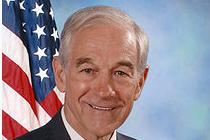|
Digital News Report – According to his book, End the Fed, Texas Congressman Ron Paul has been contemplating the twin follies of fractional reserve banking and unconstitutional government since the 1960’s. More importantly he has not kept his observations hidden from public review as he is easily the most prolifically writing politician in the nation. Not only has he written 12 books—none of which are about himself—but he produces several commentaries per month and routinely delivers speeches as a congressman and as a freedom advocate. All of this while sustaining his practice in obstetrics and gynecology.
Consequently it is no surprise that millions of Americans who consider the growing power of the federal government and the abuse of America’s monetary supply by the Federal Reserve to be a threat to our liberty and our future have sought Dr. Paul as their spokesman and leader. His recent victory in the CPAC Presidential Straw Poll has made both the man and the spontaneous movement that has flourished in his wake something that America’s political system will recognize.
Dr. Paul’s CPAC surprise has understandably inspired hope in many of those who understand and accept his message. Some have even approached states of euphoria over the future prospects of his coup. The showing suggests the Liberty Movement is rising to an influential public level that can challenge the corrupt and incompetent stranglehold the two party political system has on all levels of American government.
The possibility of having a national stage from which to voice the movement’s positions on Austrian Economics, limited government, and personal liberty is driving leaders of the Liberty Movement to organize, present their ideas, and reach out to those most interested in the future of the country—especially college students.
On the other hand, if the Liberty Movement organizes to challenge America’s centralized political system on a national level, is it not moving toward centralizing its influence as well? Should it win enough support in coming elections to begin challenging the current political order, what would keep it from focusing on keeping that support rather than working to dismantle government power? Can the Liberty Movement avoid the temptation to abandon its principles to pursue an agenda?
Dr. Paul has put some thought into how he would act as president and he well knows the problems that come with speaking truth to the powers of the federal government. Planning an agenda and being in the position to pursue it are two different things, though. Washington has become the burial ground of high hopes and noble causes. Just look back to the “Contract with America” and the ambitions of Christian Conservatives for examples of the failure of high-minded causes to restore moral restraint to American government.
America, as a monolithic global empire, has been mismanaged to the edge of a cliff just as its sister system, The European Union, which is facing break-up due to the incompetence of its elite ruling class. Those who see the problems realize hard times lie ahead. Unfortunately of those millions, only one, Dr. Paul, works where the trouble is being fueled.
As to whether or not the United States can be restored to the federal republic of its constitutional definition is a fading hope, but one that Dr. Paul holds and promotes. On the other hand, many of his ideas, such as restoring the gold standard and repealing legal tender laws, are such a threat to the power structure of Washington it is hard to conceive that such will ever be attained without a total collapse of the institutions that currently profit from the current Keynesian economic system. Those include the banking industry, the government and global corporate industries that profit from America’s profligate spending.
Dr. Paul’s ascension as a voice redirecting a concerned populace to the virtues of freedom founded in limited, controlled government is certainly encouraging. On the other hand, it is difficult to comprehend implementing economic and governing systems he has studied and articulated for our modern understanding on a national level. His positions are clearly constitutional, indeed, of all the political ideas that have been offered to the voting public, his are probably the only constitutional thoughts published since the Kentucky Resolutions.
It is certainly difficult to contemplate that a movement dedicated to dismantling the centralized power of government could take power over the system and avoid being corrupted by it. Dr. Paul, himself, might be able to hold onto his personal integrity, but could the hundreds of administrators he would need to accomplish his goals keep so clean?
Would it not be more effective to work to restore the federal balance of powers at the seat where they are best kept alive, that being within the communities that can stand to protect their homes, property, and businesses from outside influences that seek to usurp what we have worked so hard to establish? Instead of directly confronting the federal leviathan that is posing a risk to our freedom and our wealth, would we not do better to consider a locally directed political action that will direct and strengthen our neighbors when the federal dinosaur finally meets its extinction?
by Bob Strodtbeck
Bob Strodtbeck has been writing editorial commentaries since 1993. He has professional experiences in pharmaceuticals, radio, and education. He has also served as a church elder in an Orlando congregation where he has made his home since 1986.

